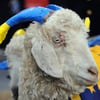The Naval Academy prides itself on its physical prowess. As one of the pillars of the institution, excellence in physical fitness is part of the mission “To develop midshipmen morally, mentally, and physically and to imbue them with the highest ideals of duty, honor, and loyalty in order to graduate leaders who are dedicated to a career of Naval service and have potential for future development in mind and character to assume the highest responsibilities of command, citizenship, and government.”
Midshipmen don’t take this responsibility lightly. From the time they are selected to attend the Naval Academy (at an acceptance rate of just eight percent), some of the top athletes in the country are physically preparing to join the rest of the Brigade. Even if they come from top notch varsity programs in their hometowns, they’ll need to make sure that they have what it takes to make it at the USNA’s elite training program.
What Does It Take to Make It? The Physical Readiness Test (PRT)
Here’s the drill. While the PRT test itself has changed over the years, the intent has not—this comprehensive test is designed to prepare tomorrow’s future naval leaders for the rigors of leadership, and to be ready at a moment’s notice to physically defend their country.
The PRT is administered when the plebes first arrive at the Academy, and then again at the end of the six-week Plebe Summer. While at the Naval Academy, midshipmen must test their fitness and endurance levels again and again with a PRT each semester. Passing these tests is a requirement for staying at the Naval Academy.
Right now, the 2022 PRT has the following stipulations:
Women
- Maximums: 85 push-ups,* timed front-plank, 9:35 1.5 mile run
- Minimums: 20 push-ups, timed front-plank, 12:40 1.5 mile run
Men
- Maximums: 101 push-ups, timed front-plank, 8:15 1.5 mile run
- Minimums: 45 push-ups, timed front-plank, 10:30 1.5 mile run
*Formerly, push-ups did not use a two second counted cadence, but this change was implemented in 2019, to keep the standards and the form consistent. It’s also a truer measurement of plebe endurance and ensures that the push-ups are done properly.
Everyone warms up before the test so that they are properly prepared and do not incur injuries. There is also a swimming or biking component that can be done in lieu of the 1.5 mile run if the midshipman is eligible—both women and men must swim 500 yards or complete a bicycle ergometer test for ten minutes. Anyone who does not pass the Navy PRT requirements must attend a PE Physical Training Remediation Program, Bridge Training Team (BTT) and take the test again.
PRT Updates: Out with the Curl-Ups, In with the Plank
Based on the abundance of scientific studies showing that repeated curl-ups can cause injury, the Naval Academy changed their PRT requirements in 2019 to replace the curl-up with a front-plank, which is considered a better indicator of overall strength and agility. The plank also mirrors typical movements of the body and will help midshipmen avoid injury. PRT proctors time the planks with a master timing clock, and midshipmen hold them for as long as possible. There’s a six minute rest period between the push-ups and the plank test, to give the participants time to adequately prepare. After this update and the counted cadence changes were introduced and tested, the Class of 2023 took the PRT with both updates for their Fall 2019 score; it was rolled out to the entire Brigade the following year.
To further standardize the movements, the USNA added the use of shoes for optimal push-up and plank positioning. For push-ups, the participant's partner’s shoe will be placed between their hands, and they will lower their chest to it; for planks, the shoe is under their knees, and any contact with the shoe ends the counting. This improvement makes it easier for proctors to ascertain proper form. All of these changes help prepare the midshipmen better and also represent their fitness level more accurately. Any updates usually take place at USNA before being implemented by the rest of the Navy, since the USNA is considered the Navy’s leading edge of physical education.
Preparing: How Long Do Incoming Plebes Need to Train?
There is no hard and fast rule to their training regimen, but the USNA provides a detailed schedule to help incoming plebes prepare for their first PRT. They recommend starting as soon as possible to avoid the pitfalls of under-preparing—the dreaded shin splints and minor foot, leg and back issues. Depending upon when they commit to the Naval Academy, this usually means several months of preparation. Midshipmen often overtrain and start the summer with painful issues, so it’s sometimes recommended to taper the workouts just prior to starting at the Naval Academy to maintain strength and freshness for the task. It’s also smart to acclimate to the weather as early as possible. Annapolis summers are hot and muggy and the midshipmen will not be spared the elements!
With all of these challenges, do you think you have what it takes to pass the PRT? This is just one test of the midshipmen’s capabilities. They prepare for PRTs with a number of grueling exercises, including 90 minutes of physical calisthenics (biking, toe raises, swimming and more) five days per week, running up to 4.5 miles at a 7-8 minute pace with interval and sprint training, obstacle and endurance courses, hand-to-hand training in boxing, wrestling and martial arts, a climbing wall, hiking and more. They cannot be too prepared.
It’s an impressive feat, and the Naval Academy Business Services Division (NABSD) is extremely proud to support the women and men at the Naval Academy in their pursuit of physical excellence. Come see them in action. Tour the Yard, dine in our restaurants, shop at Navyonline, the Gift Shop and MidStore and enjoy everything the Yard has to offer. You’ll be supporting the midshipmen in everything you do, because every bit we make goes right back to to the Brigade. While we might not be able to run a mile in seven minutes, we can provide the midshipmen with the equipment and support to get the job done—again and again.




